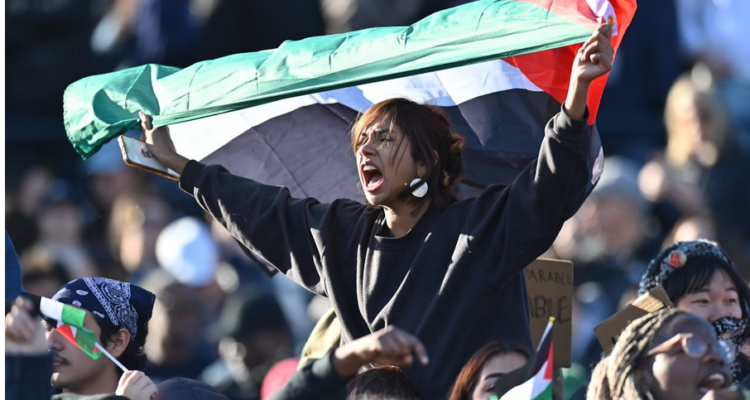Proponents of the referendum have openly stated that they are employing on its behalf arguments which conceal their intent to compromise Israel’s national security.
By Dion J. Pierre, The Algemeiner
Yale University will soon hold a student referendum on the issue of divestment from Israel, an initiative spearheaded by a pro-Hamas group which calls itself the Sumud Coalition (SC).
According to the Yale Daily News, students will consider “three questions” which ask whether Yale should “disclose” its investments in armaments manufacturers — “including those arming Israel” — divest from such holdings, and spend money on “Palestinian scholars and students.”
The paper added that a path for the referendum was cleared when a petition SC circulated amassed some 1,500 signatures, or “roughly 22 percent of the student body.”
Despite that over three-fourths of Yale students did not sign the petition, its proponents — including a representative of the Yale College Council (YCC), an ostensibly neutral body — have taken to describing it as “so popular.”
The final vote could wind up being even less representative of the opinion of the student body, as it only has to be approved by “50 percent or more of respondents” who constitute “at least one third of the student body.”
Should that happen, Sumud Coalition will claim victory and forward the results to Yale University president Maurie McInnis, with a note claiming that SC has received a mandate from the people.
Proponents of the referendum have openly stated that they are employing on its behalf arguments which conceal their intent to compromise Israel’s national security.
The Yale Daily News noted in its report that YCC Senator and SC member Sovy Pham has said the group wrote the referendum questions so as to “reframe the public perception of the pro-Palestinian and pro-divestment movement on campus.”
Summarizing Pham’s comments, the paper continued, “The referendum would change the depiction of the issue from ‘Zionist vs. anti-Zionist,’ ‘Muslims & Arabs vs. Jews,’ and ‘Left vs. Right’ to Yale + New Haven communities vs. trustees and provost” in a way that portrayed the movement as ‘Big us, small them’ … In this way, the presenters claimed, the referendum would unify the campus and surrounding New Haven communities.”
Yale University’s Advisory Committee on Investor Responsibility (ACIR) has already ruled against divesting from armaments manufacturers, saying in April that “it does not believe that such activity meets the criteria for divestment” because “this manufacturing supports socially necessary uses, such as law enforcement and national security.”
The decision set off a raging protest which resulted in the assault of a Jewish student and the arrest of some 47 students who had trespassed Beinecke Plaza, where they vowed to abstain from food unless the university acceded to their demands.
As police entered, a mass of students formed to chant, “Officer, officer, can’t you see? You’re on the wrong side of history” and other slogans comparing the officers, many of whom were Black or non-white, to the Ku Klux Klan (KKK).
However, the officers ultimately cleared the protesters from the area by 8 am, forcing them to move their demonstration off-campus.
Displeased that order had been restored, some students proceeded to verbally abuse the officers, calling them “useless pigs” and shouting “shame on you” at them.
Sumud Coalition’s renewed divestment campaign comes amid concerns that the anti-Zionist student movement is aimed at weakening the United States morally and militarily.
“The movement contains militant elements pushing it toward a wider, more severe campaign focused on property destruction and violence properly described as domestic terrorism,” researcher Ryan Mauro wrote in the recently published report, “Marching Toward Violence: The Domestic Anti-Israeli Protest Movement,” a project of the Capital Research Center (CRC).
“It demands the ‘dismantlement’ of America’s ‘colonialist,’ ‘imperialist,’ or ‘capitalist,’ system, often calling for the US to be abolished as a country.”
The group that is most responsible for the anti-Israel protest movement is Students for Justice in Palestine (SJP), Mauro explained.
Drawing on statements issued and actions taken by SJP and their collaborators, Mauro made the case that toolkits published by SJP herald Hamas for perpetrating mass casualties of civilians; SJP has endorsed Iran’s attacks on Israel as well as its stated intention to overturn the US-led world order; and other groups under its umbrella have called on followers to “Bring the Intifada Home.”
Such activities, the report explained, accelerated after Hamas’s massacre across southern Israel last Oct. 7, which pro-Hamas groups perceived as an inflection point in the Israeli-Palestinian conflict and an opportunity.
By flooding the internet and college campuses with agitprop and staging activities — protests or vandalisms — they hoped to manufacture a critical mass of youth support for their ideas, thus creating an army of revolutionaries willing to adopt Hamas’s aims as their own.
Beyond ideological concerns, Yale could be harmed financially if it adopts elements of the boycott, divestment, and sanctions (BDS) movement, which seeks to isolate Israel from the international community as a step toward its eventual elimination.
JLens, a Jewish investor network that is part of the Anti-Defamation League (ADL), published a report in September showing that colleges and universities will lose tens of billions of dollars collectively from their endowments if they capitulate to demands to divest from Israel and companies that do business with it.





